We've started implementing a new Web API with ASP.NET Core 2.2 and it has been decided that it should use Identity Server 4 for authentication/authorization duties. Furthermore, its Skoruba implementation has been chosen as it looks like it should fulfill most, if not all our needs in that regard.
We got the identity server and Skoruba up and running, but when it comes to consuming the JWT token in our own API, even assigning just one role to the test user, we'll keep hitting the same brick wall. The following request to the Skoruba API will respond with a 200:
http://localhost:5000/connect/token:
It successfully returns a JSON string with access_token, expires_in and token_type ("Bearer").
After that, a request to the http://localhost:5000/connect/userinfo route of the API with the following header
will also respond with a 200 and return the following JSON string:
{
"sub": "aeccf460-7d0d-41ae-8b52-a051138f5c05",
"role": "Administrator",
"preferred_username": "dev",
"name": "dev"
}
Please take notice that "role": "Administrator" assigned to user dev is something I set up myself using the Skoruba Admin UI, so that JSON is pretty much what I wanted. So for all intended purposes it looks like I have the information I need right now. I just can't consume it. If I try to retrieve the JWT token in our own back end, I am successful (this is obviously just for testing purposes):
[HttpGet("GetAccessToken")]
[AllowAnonymous]
public string GetAccessToken()
{
var accessToken = HttpContext.Request.Headers["Authorization"];
var token = accessToken.First().Remove(0, "Bearer ".Length);
return token;
}
With all that said, onto the actual problem: calls to a route that demands authorization in our API are treated in the same fashion as calls to Skoruba's userinfo action (particularly, the headers):
Inside this same Controller ("Foo"), I implemented a simple Get method, which should only be accessed with the correct role, which I assume is information fetched from HttpContext.Request.Headers["Authorization"] and hoped the framework would use it accordingly:
[HttpGet]
[Authorize(Roles = "Administrator")]
public IActionResult Get()
{
try
{
var response = ConvertListToJsonResponse(GetAll()); //Don't mind me
return Ok(response);
}
//...
}
At this point, my API server responds with the infamous 403 Forbidden status code. Not sure where to go from here and research proved unwieldy so far. Any help is appreciated, I'll provide more code and info if necessary.
EDIT
This is the generated token:
eyJhbGciOiJSUzI1NiIsImtpZCI6IjA4NTMzNmFmZTY0Yzg2ZWQ3NDU5YzE5YzQ4ZjQzNzI3IiwidHlwIjoiSldUIn0.eyJuYmYiOjE1Njg3NDU5NTgsImV4cCI6MTU2ODc0OTU1OCwiaXNzIjoiaHR0cDovL2xvY2FsaG9zdDo1MDAwIiwiYXVkIjoiaHR0cDovL2xvY2FsaG9zdDo1MDAwL3Jlc291cmNlcyIsImNsaWVudF9pZCI6ImF1dGhfdGVzdCIsImNsaWVudF9hY2Nlc3NfcmlnaHRzIjpbImxpc3QiLCJhcHByb3ZlIiwia2VlcCJdLCJzdWIiOiJhZWNjZjQ2MC03ZDBkLTQxYWUtOGI1Mi1hMDUxMTM4ZjVjMDUiLCJhdXRoX3RpbWUiOjE1Njg3NDU5NTgsImlkcCI6ImxvY2FsIiwic2NvcGUiOlsib3BlbmlkIiwicHJvZmlsZSIsInJvbGVzIl0sImFtciI6WyJwd2QiXX0.Ihsi6W5ukGcZ4Chkuk5XMaoqTkUR_1hBQlIcdHtMWiBA-EyAIncX5STCng_6ZPgN89Np6Y_hemFFyVtHEdN_vP6i0HuaXgznzrnJ4zq4Iiz9jxpZqpSSE9cXpSG8hPOZe5kGfD2J6_GPxnraGH_1ZF94AhmlspIvqFAAQrQ-0c7-dCduP4ledkQvBKz-rXszGp35W7Gb5nvpcVt4oe67mqETdwtgGengk2eCwHeKdA94EYnj_HErPNTjJhh5k75fDQ0IiOS-xHRK8BQmLhRh_UZwB3H5qZymFJNr_yb-ljFqIeEHptSWLBO1XrKYs1BqB9KwxIROKqmxeNGTnpCUSQ
The resulting payload:
{
"nbf": 1568745958,
"exp": 1568749558,
"iss": "http://localhost:5000",
"aud": "http://localhost:5000/resources",
"client_id": "auth_test",
"client_access_rights": [
"list",
"approve",
"keep"
],
"sub": "aeccf460-7d0d-41ae-8b52-a051138f5c05",
"auth_time": 1568745958,
"idp": "local",
"scope": [
"openid",
"profile",
"roles"
],
"amr": [
"pwd"
]
}
I see the claims I added to the client, but what I really need at the moment is simple Authentication, which I suppose should be provided by a role. Or am I completely off?


